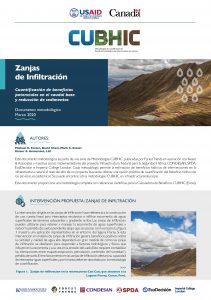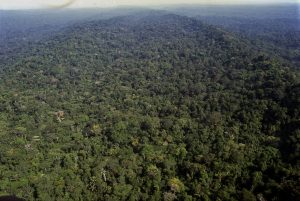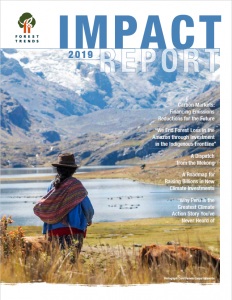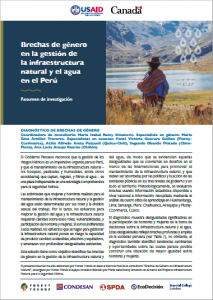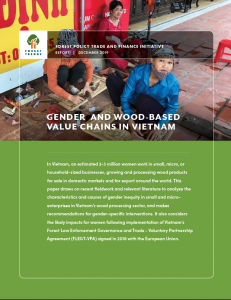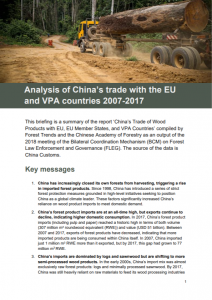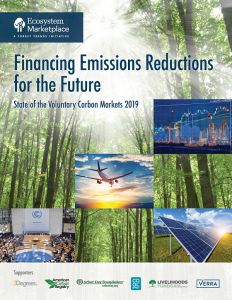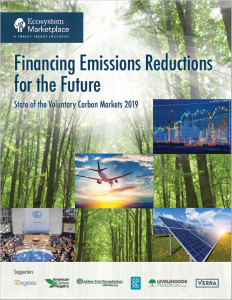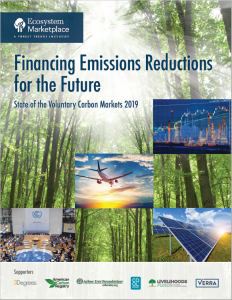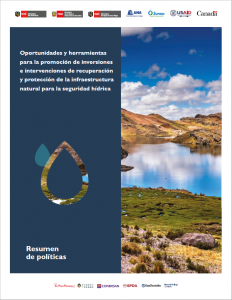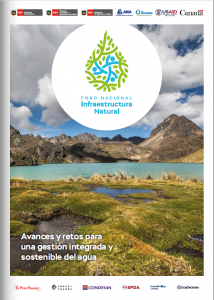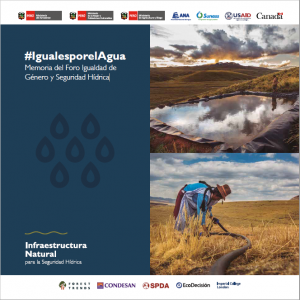Metodologías CUBHIC: Zanjas de Infiltración
By Michael E. Foster, David Chen, and Mark S. KieserEste documento metodológico es parte de una serie de Metodologías CUBHIC, publicadas por Forest Trends en asociación con Kieser & Associates y nuestros socios implementadores del proyecto Infraestructura Natural para la Seguridad Hídrica, CONDESAN, SPDA, EcoDecisión e Imperial College London. Cada metodología permite la estimación de beneficios hídricos de intervenciones en la infraestructura natural al[…]
Dependent Documents
Forest Trends Impact Report 2019
When we founded Forest Trends twenty years ago, we wanted this organization to be nimble – to be able to move fast when opportunities arose. But even by our standards, the pace has been extraordinary this year. In this year’s Impact Report, we highlight the results of our programs, and important stories from the places […]
Resumen de investigación: Brechas de género en la gestión de la infraestructura natural y el agua en el Perú
By Patricia CarrilloEl presente resumen ha sido elaborado por Forest Trends en base al informe final de la consultoría “Brechas de Género en Infraestructura Natural”, encargado por Forest Trends al equipo consultor liderado por María Isabel Remy Simatovic en el marco del Proyecto Infraestructura Natural para la Seguridad Hídrica. El diagnóstico muestra desigualdades significativas en la participación[…]
Email Signup
Subscribe to any of Forest Trends’ mailing lists to keep up with the news, publications, and events that interest you.
Having Trouble?
If you experience any technical difficulties on our site, please contact Genevieve Bennett, Communications Manager.
Gender and Wood-Based Value Chains in Vietnam
In Vietnam, an estimated 2-3 million women work in small, micro, or household-sized businesses, growing and processing wood products for sale in domestic markets and for export around the world. This paper draws on recent fieldwork and relevant literature to analyze the characteristics and causes of gender inequity in small and microenterprises in Vietnam’s wood[…]
Analysis of China’s trade with the EU and VPA countries 2007-2017
By EU FLEGT Facility and Forest TrendsThis paper assesses China’s forest product imports from FLEGT VPA countries and exports to the EU between 2007-2017, set within the context of China’s overall trade and market dynamics driving supply and demand for forest products. The report shows how China’s closure of its own forests from harvesting has triggered a rise in imported forest products,[…]
State of the Voluntary Carbon Markets 2019
Financing Emissions Reductions for the Future
Ecosystem Marketplace was initially created to improve transparency and price discovery in the voluntary space, as there is no centralized system for transacting voluntary carbon credits. Between 2006 and 2018, our team has annually distributed surveys to our network of project developers, investors, retailers, and brokers to collect confidential information about their voluntary carbon offset […]
Dependent Documents
State of Voluntary Carbon Markets 2019: Market Overview
By Stephen Donofrio, Patrick Maguire, William Merry, and Steve ZwickState of the Voluntary Carbon Markets 2019: Market Direction
By Stephen Donofrio, Patrick Maguire, William Merry, and Steve ZwickState of the Voluntary Carbon Markets 2019: Market Dynamics
By Stephen Donofrio, Patrick Maguire, William Merry, and Steve ZwickResumen de políticas: Oportunidades y herramientas para la promoción de inversiones e intervenciones de recuperación y protección de la infraestructura natural para la seguridad hídrica
El presente documento tiene como objetivo presentar las oportunidades y herramientas que requieren ser impulsadas prioritriamente a fin de dinamizar mayores inversiones y recursos para la protección, conservación, y mantenimiento de la infraestructura natural, como un componente estratégico para la gobernanza hídrica nacional.
Foro Nacional Infraestructura Nacional: Folleto
Avances y retos para una gestión integrada y sostenible del agua
El Foro Nacional sobre Infraestructura Natural permitirá dar a conocer lo avanzado en Perú, resaltando la importancia de una gestión integrada de los recursos hídricos y enfatizando cómo la infraestructura natural juega un papel fundamental en su sostenibilidad.
Iguales por el Agua
Memoria del Foro Igualdad de Género y Seguridad Hídrica
La desigualdad de género y la inseguridad hídrica son incompatibles con una existencia digna. Las políticas nacionales de Igualdad de Género y de Recursos Hídricos del Perú reconocen estas prioridades entre las más altas del país; sin embargo, las brechas de género y los riesgos hídricos no se están reduciendo en el ritmo esperado. Es[…]

